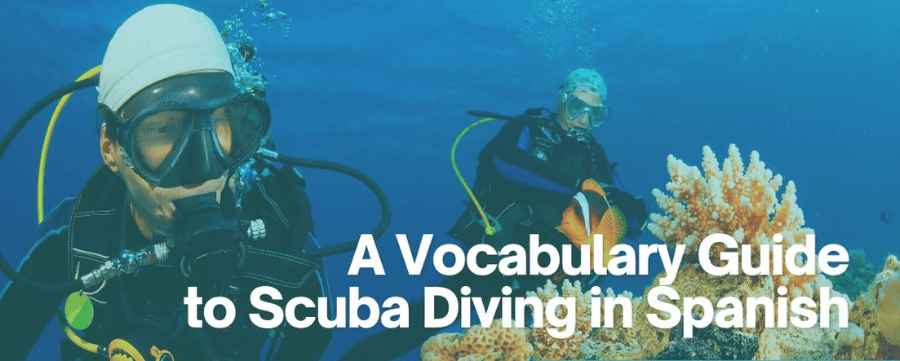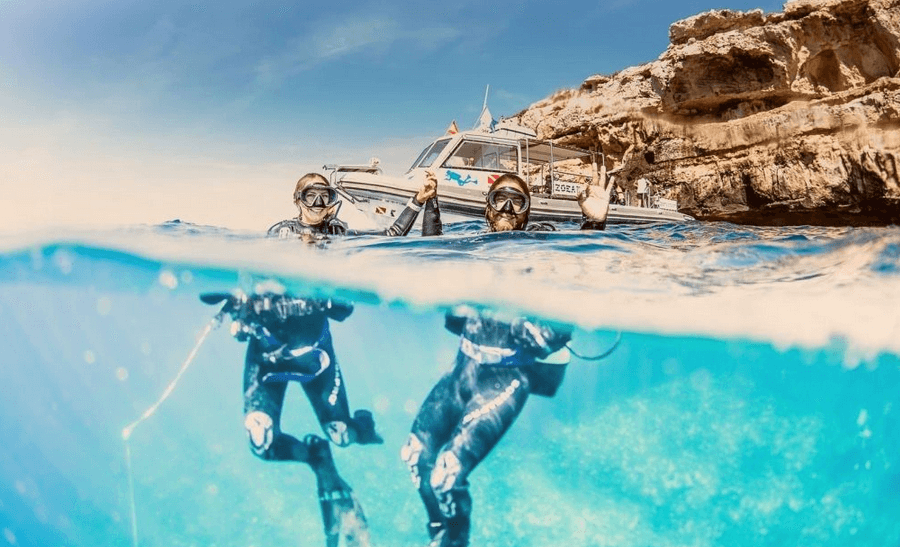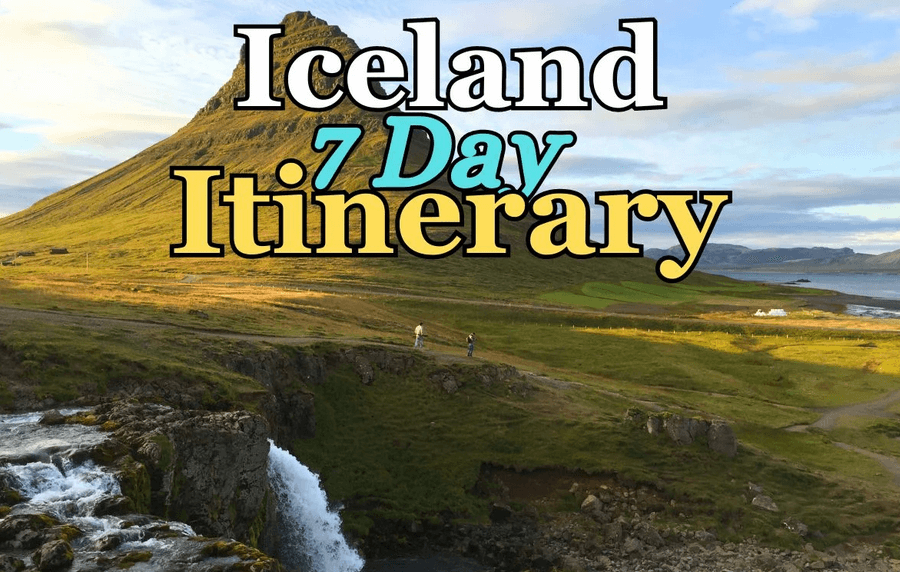📑Table of Contents:
Scuba diving offers a thrilling way to explore the underwater world. When you add the challenge of navigating this adventure in a Spanish-speaking environment, the experience becomes even more rewarding. Whether planning a dive trip to Mexico, the Caribbean, or Spain, learning some scuba diving terms in Spanish will enhance your experience. This guide will take you through essential scuba diving vocabulary, top Spanish-speaking destinations, and tips for diving in these regions.

Why Learn Scuba Diving Terms in Spanish?
Understanding scuba diving terms in Spanish is more than just a useful skill; it’s a way to connect with the local diving community and enhance your overall experience. Here’s why it’s important:
- Improved Communication: Knowing the terms allows you to communicate effectively with instructors, dive guides, and fellow divers, ensuring a safer and more enjoyable dive.
- Cultural Immersion: Diving in Spanish-speaking countries becomes a richer experience when you can engage with the local culture and language.
- Safety: Understanding instructions and safety protocols in Spanish can prevent misunderstandings and ensure you are well-prepared for your dive.
Top Spanish-Speaking Destinations for Scuba Diving
The Spanish-speaking world is home to some of the most breathtaking dive sites on the planet. Here are a few top destinations where you can enjoy scuba diving while practicing your Spanish:
1. Cozumel, Mexico
Cozumel is a world-renowned diving destination known for its vibrant coral reefs, clear waters, and diverse marine life. The Mesoamerican Reef, the second-largest barrier reef in the world, runs along the coast of Cozumel, offering stunning dive sites like Palancar Reef and Santa Rosa Wall.
- Why It’s Great: Cozumel’s underwater visibility can reach up to 200 feet, making it ideal for exploring coral formations and spotting colorful fish.
- Language Tip: Practice phrases like ¿Cuántos metros vamos a bucear? (How many meters will we dive?) and ¿Hay corrientes fuertes hoy? (Are there strong currents today?).
2. The Canary Islands, Spain
The Canary Islands, located off the northwest coast of Africa, offer diverse dive sites with volcanic landscapes, caves, and rich marine biodiversity. Popular islands like Tenerife, Gran Canaria, and Lanzarote are home to fascinating dive spots, including shipwrecks and underwater caves.
- Why It’s Great: The warm waters and unique underwater topography make the Canary Islands a must-visit for divers seeking something different.
- Language Tip: Learn phrases such as ¿Dónde está el arrecife? (Where is the reef?) and ¿Cuánto aire me queda? (How much air do I have left?).
3. Roatán, Honduras
Roatán, part of the Bay Islands of Honduras, is a diver’s paradise. The island is surrounded by the Mesoamerican Reef, offering excellent dive sites with abundant marine life, including whale sharks, dolphins, and sea turtles.
- Why It’s Great: Roatán’s calm, warm waters and extensive coral reefs make it an ideal destination for beginners and experienced divers.
- Language Tip: Use phrases like ¿Cuánto dura la inmersión? (How long is the dive?) and Necesito ajustar mi chaleco compensador (I need to adjust my BCD).
4. Galápagos Islands, Ecuador
The Galápagos Islands are famous for their unique marine life, including species found nowhere else on Earth. Diving here offers the chance to see hammerhead sharks, manta rays, and even penguins in their natural habitat.
- Why It’s Great: The Galápagos Islands offer some of the most extraordinary diving experiences, with opportunities to encounter rare species.
- Language Tip: Ask ¿Cuándo es la mejor época para bucear? (When is the best time to dive?) and ¿Hay tiburones en esta área? (Are there sharks in this area?).
Essential Scuba Diving Vocabulary in Spanish

Before you dive into the water, it’s helpful to familiarize yourself with key scuba diving terms in Spanish. Here are some of the most important words and phrases:
- Scuba Diving – Buceo con tanque or Buceo autónomo
- Dive Instructor – Instructor de buceo
- Dive Buddy – Compañero de buceo
- Mask – Máscara or Careta
- Fins – Aletas
- Wetsuit – Traje de neopreno
- Buoyancy Control Device (BCD) – Chaleco compensador
- Regulator – Regulador
- Oxygen Tank – Tanque de oxígeno or Botella de oxígeno
- Depth – Profundidad
- Pressure Gauge – Manómetro
- Descent – Descenso
- Ascent – Ascenso
- Safety Stop – Parada de seguridad
- Reef – Arrecife
- Marine Life – Vida Marina
- Visibility – Visibilidad
- Current – Corriente
Tips for Scuba Diving in Spanish-Speaking Destinations
Diving in a Spanish-speaking country is an incredible experience, but being prepared is important. Here are some tips to help you make the most of your adventure:
1. Learn the Basics
Before your trip, learn basic scuba diving terms in Spanish. This will make it easier to follow instructions, ask questions, and communicate with your dive buddies.
2. Practice with Locals
Take the opportunity to practice your Spanish with local dive instructors and fellow divers. They’ll appreciate your effort, and you’ll gain confidence in using the language in a real-world setting.
3. Use Dive Logs in Spanish
If you’re keeping a dive log, try writing your entries in Spanish. This practice will reinforce your vocabulary and help you remember important terms.
4. Ask for Clarification
If you don’t understand something, don’t hesitate to ask for clarification. Use phrases like ¿Puedes repetirlo, por favor? (Can you repeat that, please?) or ¿Qué significa eso? (What does that mean?).
5. Embrace the Experience
Diving is about exploration and adventure. Embrace the experience of learning and speaking Spanish while diving. It will make your trip even more memorable.

Conclusion
Scuba diving in Spanish-speaking destinations offers an incredible opportunity to explore beautiful underwater landscapes while immersing yourself in a new language and culture. By learning essential scuba diving terms in Spanish and practicing them during your dives, you can enhance your experience and connect more deeply with the local diving community.
Whether diving in Cozumel’s crystal-clear waters, exploring the Canary Islands’s volcanic reefs, or swimming with sharks in the Galápagos, speaking the language will enrich your adventure. Prepare, practice, and enjoy the journey above and below the surface.





